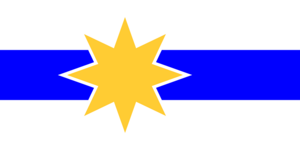Difference between revisions of "Libertine Party"
| Line 1: | Line 1: | ||
[[File:Flag of the Libertine Party.png|thumb|Flag of the Libertine Party]] | |||
The '''Libertine Party''' (the Party) is the sole legal political party of the Principality, defined as such by the [[Constitution]]. All government appointees, civil servants with policy making power, and most elected officials must be members of the Party. Although it has a monopoly on political power, the Party is technically a non-governmental organization, meaning that it is not funded by tax or other government revenue, but rather by membership dues, certain business ventures, investments, and donations. The [[Princess]] is the head of the Party, being its Secretary. | The '''Libertine Party''' (the Party) is the sole legal political party of the Principality, defined as such by the [[Constitution]]. All government appointees, civil servants with policy making power, and most elected officials must be members of the Party. Although it has a monopoly on political power, the Party is technically a non-governmental organization, meaning that it is not funded by tax or other government revenue, but rather by membership dues, certain business ventures, investments, and donations. The [[Princess]] is the head of the Party, being its Secretary. | ||
Revision as of 00:04, 21 June 2021
The Libertine Party (the Party) is the sole legal political party of the Principality, defined as such by the Constitution. All government appointees, civil servants with policy making power, and most elected officials must be members of the Party. Although it has a monopoly on political power, the Party is technically a non-governmental organization, meaning that it is not funded by tax or other government revenue, but rather by membership dues, certain business ventures, investments, and donations. The Princess is the head of the Party, being its Secretary.
Etymology
In an ideal world, the Libertine Party would have been named the Libertarian Party, a more direct derivation from the word "liberty" owing to the Party's ideals of individual freedom, however "libertarian" already has multiple, sometimes conflicting, definitions with regards to politics, and attempting to add another would only confuse. "Libertine", while also a preexisting word, is far less common and lacks much if not all political baggage while sounding close enough to the word "liberty" to make its point. Derivations of different words which mean similar things, such as "freedom" were deemed clumsy and dissonant.
Purpose and Ideology
The purpose of the Party is to educate, train, and select the Principality's leadership. Advancement in the government bureaucracy requires advancement within the Party, and advancement within the Party is attained through a combination of competency and the internalization of the core values of the Pillow Fortress, which are to be reproduced and replicated throughout society by means of law and policy.
There is no name for the ideology of the Party, as it is an eclectic mix of ideas and concepts taken from across the political spectrum, though it is ultimately left wing. At its core is the acceptance of Materialism, and more specifically Historical Materialism as presented by Marx, that is, that historical developments are the result of changes in the relationship between mankind and the means of production, as well as the Labor Theory of Value. Despite these Marxist features, the Party disclaims Proletarian Internationalism, revolution, and Communism both as a political program and as a desirable system for the end of history.
The Party is, of course, monarchist, but this is a kind of modern, non-traditionalist monarchism which does not base its legitimacy on such things as the Divine Right of Kings or the unbroken line of succession from some other pre-existing monarchical dynasty.
